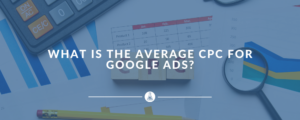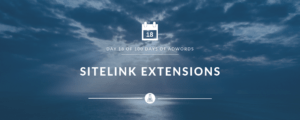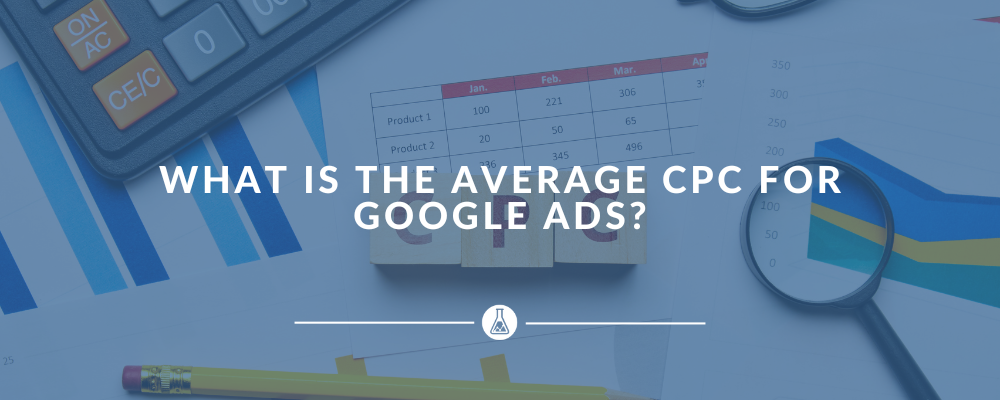Understanding how much each click costs on Google Ads is crucial for running efficient ad campaigns.
Average CPC (Cost Per Click) varies across different industries and largely depends on your choice of keywords and how relevant your ads are.
The US CPC rate tends to be higher than in other regions, making cost control essential for advertisers targeting American audiences.
Here’s what influences the cost:
Your Quality Score and Ad Rank determine your actual CPC. It’s important to fine-tune your bids and enhance the quality of your ads to get better ad placement.
Regularly check your campaign’s performance.
This guide cuts straight to the chase, offering clear insights and practical strategies to help you manage your advertising budget wisely.
Learn how to balance getting noticed with keeping costs down in your next campaign.
Everything this article covers
What Exactly Is Cost Per Click (CPC) in Google Ads?
Cost Per Click (CPC) is a key metric in Google Ads that dictates the price you pay every time someone clicks on your ad. This rate can fluctuate widely, generally ranging from $0.11 to $0.50, influenced by factors like keyword competition and ad relevance.
Understanding the average CPC is crucial for budget planning and optimizing ad spend efficiency.
So, how much google ads should you invest in? The answer lies in finding the sweet spot between your budget and desired results.
Yet, what does this mean for your google ads campaigns? Simply put, understanding CPC is akin to having a financial sixth sense, enabling you to navigate the Google Ads platform with finesse. It’s about making each dollar in your monthly Google Ads spend count, ensuring your average google ads costs stay low while your ad’s visibility soars high.
How Does the Google Ads Auction System Work?
At the heart of Google Ads is an auction system where your ad competes with others to appear to potential customers. This process is governed by your Ad Rank—a combination of your bid amount, ad quality (Quality Score), and expected impact from extensions.
Imagine it as a high-stakes game where the Quality Score weighs your ad’s relevance against competitors, directly influencing your Ad Rank and, by extension, your actual CPC. But how does this affect your Google ads costs? Consider this: the actual CPC is typically less than your maximum bid, influenced by the ad below yours and the almighty Quality Score.
Understanding this can help you strategize to achieve lower CPCs by enhancing ad relevance and landing page quality.
What Should You Expect to Pay? CPC Across Different Industries
The world of CPC (Cost Per Click) varies greatly across different industries. In retail, CPCs might be as low as $1.16, while in personalized services they can climb to $6.00. When it comes to the display network, travel and hospitality see lower CPCs at just $0.44, but this number rises to $1.49 in the dating and personals sector. Let’s take a closer look at these sectors to understand what drives their CPC rates.
Retail Sector CPC Insights: What Do They Tell Us?
In the retail sector, CPC rates vary widely, much like the assortment of products they represent. For example, in Amazon Ads, the clothing category has a CPC of $0.44, while electronics—a high-demand area—have a higher CPC at $0.79 per click. The health and sports categories also show significant competition, with CPCs ranging from $0.90 to $1.27.
Understanding these CPC variations is essential for retailers who want to optimize their PPC campaigns on platforms like Amazon Ads. It’s about spending wisely on PPC, making sure their products are not only seen but also competitively priced. As we dig deeper into the CPC trends within the retail sector, it’s evident that the right knowledge can greatly enhance profitability.
Travel Industry CPC Overview: What Does It Reveal?
In the travel industry, CPC rates are as inviting as a last-minute travel deal. Google Ads Display offers some of the lowest CPCs, starting at just $0.44 per click, which is attractive for marketers. However, experienced advertisers know that there’s more to a successful campaign than just low CPC rates.
Diving deeper, adjusting strategies like changing location targeting from ‘Presence’ to ‘Presence or Interest’ can lead to a 5% increase in conversions for search campaigns. This shows the importance of well-planned strategies in travel advertising. The right approach to CPC can significantly boost a campaign’s profitability.
Service-Based Business CPC Rates: What’s the Impact?
In service-based businesses, CPC rates tend to be higher, reflecting the significant value and revenue potential of each client. Industries like legal services or real estate, where a single conversion can generate substantial revenue, see higher CPCs as a necessary investment. This is how these businesses secure an entry into markets where premium services are valued.
The strategy in this sector involves balancing CPC against the potential lifetime value of a customer. It’s a tactical approach, focusing on long-term gains where average CPC and CPA are not just numbers, but indicators of potential business growth. In these industries, investing in CPC means investing in future returns.
How Do Geography and Devices Influence CPC?
CPC rates vary by both geography and technology. Each country has its unique economic rhythm which affects its CPC rates due to differences in competition levels and currency strength. For example, Japan has the highest CPC rate for Facebook Ads at $1.6 per click, closely followed by the United States at $1.1, showing diverse CPC patterns globally.
Looking at the devices we use, there’s another dimension to CPC. Mobile traffic is increasing, yet desktops remain dominant in certain industries, influencing Google Ad costs. Advertisers must tailor their bids and strategies to the devices their audiences prefer. This targeted approach can help optimize costs effectively.
How Can You Craft an Effective Keyword Strategy?
In digital marketing, choosing the right keywords is crucial—it’s like picking the perfect spices for a meal. A successful keyword strategy combines several related keywords, views them from the customer’s perspective, and includes just enough detail to be specific. Think of it as using adjectives wisely in cooking, adding them only to enhance the dish.
Long-tail keywords are especially valuable. They allow for more targeted advertising, potentially reducing CPCs. By using long-tail keywords, you’re not just casting a wide net—you’re aiming for the specific, valuable catch that your audience desires. This targeted approach improves ad relevance and connects more effectively with your audience’s interests.
How Can You Improve Ad Relevance and Landing Page Quality?
The success of an ad campaign hinges on two key factors: relevance and quality. A high Quality Score, which reflects expected click-through rates, the appeal of your landing page, and how well your ad’s message resonates, can lead your ads to success. Enhancing ad relevance involves branding your keywords, refining your ad groups, and ensuring your ad copy aligns with the intent of your keywords.
Landing pages play a crucial role too. A good landing page loads quickly, is mobile-friendly, and fulfills the promises made by your ad. This alignment between your ad and your landing page not only meets user expectations but also helps seal the deal.
By focusing on both ad relevance and landing page quality, you can significantly boost your Quality Score and elevate your campaign’s performance.
How Can Scheduling and Targeting Reduce Your CPC?
Timing and targeting are crucial for lowering CPC. Ad scheduling allows you to display your ads at the most effective times, aligning with when your audience is most likely to convert, thus optimizing your ad spend.
Geographic targeting also plays a critical role. By targeting ads to specific locations, you can connect more effectively with local audiences, which can help reduce CPC costs. Combining precise ad scheduling with strategic geographic targeting can lead to more efficient ad campaigns, ensuring every dollar spent contributes to optimal performance.
How Can Tools and Expertise Enhance Your Google Ads Campaigns?
Navigating Google Ads campaigns can be complex, but several tools and software solutions act as guides. Here are some to consider:
- Ads Launch Assistant app. An AI ad generator that uses SEMrush insights.
- WordStream. A software preferred by those who want PPC agency expertise.
- Shape and Acquisio. Both are software solutions aimed at managing Google Ads costs effectively.
These tools help refine your campaign strategies with data-driven accuracy.
However, the journey doesn’t stop with tools.
Google Ads experts are also available to provide guidance on campaign setups, budget management, and keep you informed about updates on the platform.
Leveraging all available resources—from Google’s insights to expert advice—ensures your campaigns are well-positioned to succeed in a dynamic advertising environment.
How Does AI Enhance CPC Management in Advertising?
The future of CPC management lies in AI algorithms, not chance. Google’s AI-driven advertising tools serve as a guiding light, opening up new customer acquisition channels and improving business performance. AI promises real-time optimization and more effective use of budgets, offering advertisers a dependable ROI.
AI’s influence goes beyond just crunching numbers—it improves overall business strategy and creativity in campaigns. Here are some benefits of using AI in PPC advertising:
- AI allocates budgets across campaigns and ad groups based on real-time data, acting like a constant strategist to ensure the success of your PPC campaigns.
- AI-driven methods are precise, reducing the likelihood of human errors.
- It frees up time for you to focus on strategic and creative tasks.
- Enhanced CPC (ECPC) Strategy. This approach blends manual insights with Smart Bidding technology, allowing for more effective, conversion-focused bidding.
Using AI in advertising can lead to smarter, more efficient campaigns that are better aligned with business goals.
We live, breathe & Dream Paid Traffic
Why Are Regular CPC Strategy Audits Crucial for Staying Competitive?
Monitoring the average CPC Google Ads trends helps adjust bidding strategies and improve overall campaign performance.
To stay on top in the fast-paced world of digital advertising, it’s vital to conduct regular Google Ads campaign audits. Think of these audits as routine health check-ups for your campaigns, which are necessary to identify problems and enhance overall performance. These reviews are especially important during significant changes in Google Ads campaigns, shifts in business goals, or changes in competitor strategies.
A thorough audit can reveal many opportunities for optimization. For example, a landing page that gets a lot of traffic but doesn’t convert well might need a detailed review and strategic improvements. By committing to regular audits—at least monthly—and making daily or weekly adjustments, advertisers can keep their campaigns flexible, responsive, and ahead of the curve in an ever-changing advertising landscape.
How Can You Enhance Your Google Ads Campaigns with Exclusive Insights?
Knowledge is a powerful tool, especially in the world of CPC optimization where it can elevate good campaigns to great ones. To arm yourself with this power, we offer a downloadable checklist filled with advanced strategies to perfect your Google Ads campaigns. This resource covers everything from keywords and ad copy to bid strategies and targeting options, essential for mastering Google Ads optimization.
But learning doesn’t stop with a download. Subscribing to our insights provides ongoing, in-depth updates that keep your campaigns flourishing. Join our community dedicated to Google Ads excellence, where strategic optimizations boost your campaign results beyond expectations.
Summary
Many advertisers ask, what is the average CPC for Google Ads?, but the answer varies widely depending on industry and competition.
As we wrap up our deep dive into CPC in Google Ads, let’s take a moment to reflect on what we’ve learned together. We’ve explored the crucial role of CPC in shaping ad campaigns, dug into the mechanics of the auction process, and seen how CPC stacks up against other pricing models. We’ve also navigated through the nuances of industry-specific CPC trends and examined how geography and device preferences impact costs.
Throughout this journey, we’ve delved into key strategies for selecting the right keywords, enhancing ad relevance, and improving landing page quality. We’ve also discovered how smart scheduling and precise targeting can make a big difference in your campaigns. Plus, we’ve highlighted some innovative tools and AI technologies that streamline campaign management and discussed why regular CPC audits are so beneficial.
Frequently Asked Questions
What factors influence the average CPC in Google Ads campaigns?
The average CPC in Google Ads campaigns is influenced by factors such as industry competitiveness, keyword specificity, ad relevance, Quality Score, geographic location, device targeting, and the timing of ad run. It’s important to consider these factors when planning your campaigns.
How can I use Google Keyword Planner to improve my CPC rates?
You can use Google Keyword Planner to find long-tail keywords that are less competitive, potentially reducing your CPC rates while still reaching relevant audiences for your campaigns. This can be a valuable strategy for optimizing your advertising efforts.
What is a Quality Score, and why is it important for CPC?
A Quality Score is a metric used by Google to assess the relevance and quality of your ads and landing pages to users’ search queries. It is important for CPC because a higher Quality Score can lead to better ad placement and lower CPC rates.
Can changing my ad scheduling reduce my CPC costs?
Yes, optimizing your ad scheduling to target peak times when your audience is most active can improve ad performance and potentially lower your CPC costs.
How often should I conduct a CPC strategy audit?
Conduct a thorough CPC strategy audit at least once a month to maintain optimal campaign performance and make additional tweaks on a daily or weekly basis as needed.

Mastering Psychographic Segmentation: Examples and Techniques for Success




